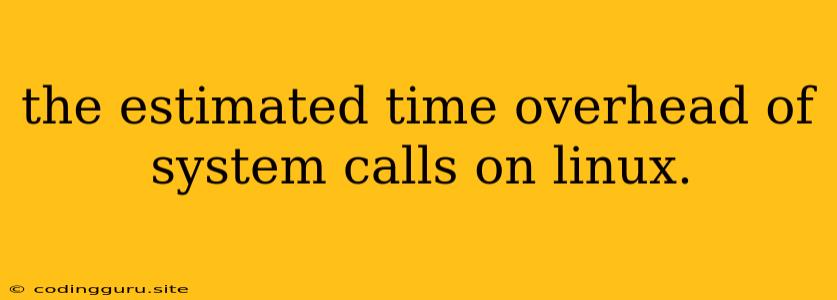Understanding the Overhead of System Calls on Linux
System calls are the fundamental mechanism through which user programs interact with the Linux kernel. They allow applications to request access to system resources, such as memory, files, and devices. While essential for functionality, system calls come with a performance cost – the estimated time overhead of system calls on Linux. This overhead can significantly impact application performance, especially in scenarios involving frequent system call execution.
Why System Calls Have Overhead
The overhead associated with system calls stems from the context switching and data transfer involved in the process. Here's a breakdown:
-
User to Kernel Transition: When a user program makes a system call, the CPU must switch from user mode to kernel mode. This involves saving the user program's execution context, including registers and memory pointers, and loading the kernel's context.
-
Kernel Processing: Once in kernel mode, the system call handler performs the requested operation. This might involve accessing system resources, manipulating data structures, or scheduling other tasks.
-
Data Transfer: Depending on the system call, data may need to be transferred between the user space and the kernel space. This adds to the overhead, especially for large data transfers.
-
Return to User Space: After completing the system call, the kernel switches back to user mode, restoring the user program's context. This involves loading the user program's registers and memory pointers.
Factors Influencing System Call Overhead
Several factors contribute to the estimated time overhead of system calls on Linux:
-
System Call Type: Some system calls, like
read()andwrite(), are relatively simple and have minimal overhead. Others, likefork()orexecve(), are more complex and incur higher overhead. -
System Load: A heavily loaded system can lead to increased system call overhead due to contention for resources and delays in kernel processing.
-
Hardware: The speed of the CPU and the performance of the memory subsystem can impact the overall time required for context switching and data transfer.
-
Kernel Configuration: The kernel configuration can impact system call performance. For instance, using a preemptive kernel can increase context switching overhead.
Minimizing System Call Overhead
While system calls are unavoidable for many applications, there are techniques to minimize their impact:
-
Batching System Calls: Instead of making numerous small system calls, group related operations into a single larger system call. This reduces the number of context switches and data transfers.
-
Using System Call Wrappers: Libraries like
glibcprovide optimized system call wrappers that can reduce overhead by handling common scenarios more efficiently. -
Avoiding Unnecessary System Calls: Carefully consider the need for each system call and look for alternatives, such as using in-memory data structures or caching results to reduce the frequency of system calls.
-
Using Asynchronous I/O: Asynchronous I/O operations allow the application to continue processing while waiting for I/O to complete, reducing the impact of I/O-bound system calls on overall performance.
-
Optimizing the Kernel: Consider configuring the kernel to optimize system call performance for specific workloads.
Measuring System Call Overhead
To measure the estimated time overhead of system calls on Linux, you can use tools like:
-
strace: This tool can trace system calls made by a process and provide information about their execution time.
-
perf: This profiling tool can measure the time spent in system calls and identify bottlenecks.
-
oprofile: Similar to
perf, this tool provides detailed profiling data, including information about system call execution times.
Example
Let's consider an example where we measure the overhead of the read() system call:
#include
#include
#include
int main() {
char buffer[1024];
struct timeval start, end;
gettimeofday(&start, NULL);
read(0, buffer, 1024);
gettimeofday(&end, NULL);
double elapsed = (end.tv_sec - start.tv_sec) + (end.tv_usec - start.tv_usec) / 1000000.0;
printf("System call overhead: %f seconds\n", elapsed);
return 0;
}
This program reads data from the standard input (0) and measures the elapsed time. This elapsed time includes the overhead of the read() system call. By performing this measurement multiple times, we can get a better estimate of the average system call overhead.
Conclusion
The estimated time overhead of system calls on Linux is an important factor to consider for performance-critical applications. While system calls are essential for functionality, minimizing their overhead can significantly improve performance. Understanding the factors influencing system call overhead and employing techniques to minimize it are crucial for developing efficient and responsive Linux applications.
